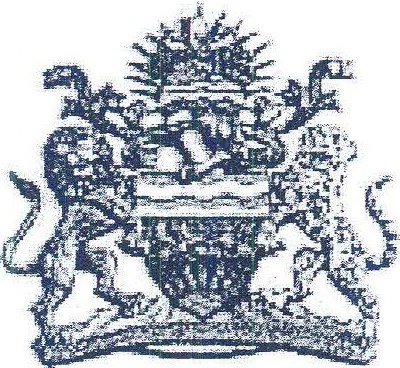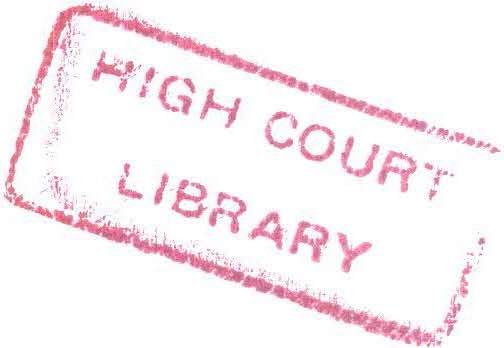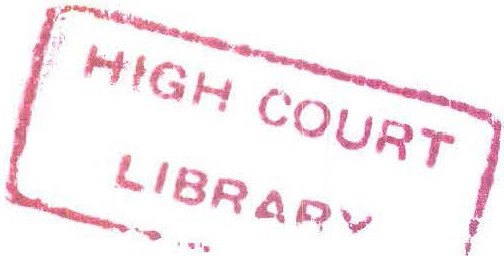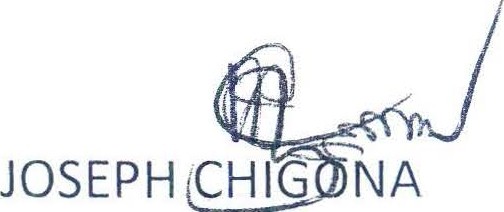

IN THE HIGH COURT OF MALAWI
PERSONNAL INJURY CASE NUMBER 445 OF 2015
BETWEEN:
LOVENESS TCHUKAMBIRI PLAINTIFF
-AND -
S.M. MAYUNI 1ST DEFENDANT
PRIME INSURANCE COMPANY LIMIT 2ND DEFENDANT

CORAM: THE HONOURABLE JUSTICE J. CHIGONA
Mr Chancy Gondwe, of Counsel, for the plaintiff
Defendants absent despite service
Mr. Kamchiputu - Official Interpreter

![]()
JUDGEMENT
CHIGONA, J .
INTRODUCTION:
The plaintiff, by Writ of Summons dated 27th May 2015, commenced the present proceedings against the defendants for negligence. The 1st defendant is being
sued as the owner of the motor vehicle registration Number KA 6764 Mazda Bongo Minibus and the 2nd defendant as the insurer of the said motor vehicle. The facts of the case are that on 5th day of February 2015, the 1st defendant's driver was driving the insured motor vehicle alluded to above from the direction of Limbe to machinjiri a long Limbe Machinjiri Road. When at St. Theresa Private school stage the 1st Defendant's driver negligently drove, controlled and managed the said motor vehicle that as he tried to stop, the plaintiff fell down after disembarking and in the course of rolling backwards, the plaintiff's right arm was over-run by the front near side tyre of the vehicle.
The particulars of the negligence can as well be extracted from the Statement of Claim. The particulars of the negligence are as follows:
a. Driving the said motor vehicle without due regard for the safety of the other road users and passengers.
b. Failing to stop, by applying the hand brakes so as to avoid the said accident.
c. Failing to have pro per look out.
d. . Generally failure to comply with the Road Traffic Rules and Regulations.
2. As a result of the said accident the plaintiff herein sustained very serious injuries and has suffered loss and damage.
THE EVIDENCE:
During the trial, the plaintiff called one witness who happen to be the plaintiff herself, Loveness Tchukambiri. Upon taking her oath, the witness started by telling the court that she is 31 years of age and that she stays in Machinjiri township in Blantyre. She told the court that she is not working at the moment. She adopted and tendered her witness statement as her evidence -in-chief.
The facts of the case as contained in her witness statement are exactly the same as a lluded to above. She also tendered in evidence a police report exhibited as EXH Pl. She also tendered in evidence a medical report exhibited as EXH P2. She explained to this court that both the police report and medical report were tendered not as to their truth but as a fact that she obtained them (emphasis
added). She told the court that due to the negligence of the 1st defendant's driver, she sustained fracture of the right arm and bruises of the right leg.
ISSUE(S) FOR DETERMINATION:
The main issues for the determination of the court is the consideration of the question whether the accident herein was caused by the negligence of the driver of the motor vehicle registration number KA 6764 belonging to the 1st defendant.
LAW:
The burden of proof lies on a party alleging a fact of which a correlative rule is that he who asserts a matter of fact must prove it. The party on whom lies the burden must adduce evidence of the disputed facts or fail in his contention. Simply put he who alleges must prove. In contested actions a party succeeds whose evidence establishes a preponderance of probability or balance of probability in his or her favour.
 On the standard of proof in civil cases, Denning J, as he then was said in the case of Miller V Ministry of Pensions1
On the standard of proof in civil cases, Denning J, as he then was said in the case of Miller V Ministry of Pensions1
"That degree is well settled. It must carry a reasonable degree of probability, not so high as is required in criminal cases. If the evidence is such that a tribunal can say 'we think it more probable that not' the burden is discharged but if the probabilities are equal it is not".
See also Joseph Constantine Steamship Line V Imperial Smelting Corporation Limited2, Malawi Distilleries Limited V John Sichilima3
 In Kadawire V Ziligone and Another4, Ndovi J, stated the following on the law of negligence:
In Kadawire V Ziligone and Another4, Ndovi J, stated the following on the law of negligence:
"For an action in negligence to succeed, the plaintiff must show that (a) there was a duty of care owed to him, (b) that
the duty has been breached and (c) that as a result of that breach he has suffered loss and damage; Donoghue V Stevenson {1932} AC 562. The duty of care of a person who drives a motor vehicle on a highway is to use reasonable care to avoid causing damage to vehicles or property on the highway or on the adjoining highway."
The law is such that a drive of a motor vehicle owes a duty of care to other road users not to ca use damage to persons, vehicles and property of any one on or adjoining the road. He must use reasonable care which an ordinary skilful driver would have exercised under all the circumstances. In the case of Banda and Others V Admarc and Another5, Banda J as he then was stated in that case:
"A driver of a motor vehicle owes a duty of care to other road users not to cause damage to persons, vehicles and property of anyone on or adjoining the road. He must use reasonable care which an ordinary skilful driver would have exercised under all the circumstances. A reasonable skilful driver has been defined as one who avoids excessive speed, keeps a good look - out, observes traffic signs and signals ..."
This statement of law was cited with approval by the Supreme Court in the case of Southern Bottlers Limited and Another V Charles Chimdzeke6, See also: Kachingwe V Mangwiro Transport Motorways Company Limited7 Furthermore according to the learned authors Charlesworth and Percy in their book on Negligence8
"It is the duty of the driver or rider of a vehicle to keep a good look - out. Indeed a driver will be held negligent if he fails to notice in good time that the actions of another person have created a potential danger. He must look out for other traffic, which is or may be expected to be on the road, whether in front of him, behind him or alongside him, especially at crossroads, junctions and bends. Also he must look out for traffic - light, signals and traffic signs including lines marked on the highway. Disregard of traffic signals and failure to keep a proper look - out are both evidence of
4
negligence. When there are pedestrians about, the driver or rider must be ready in case they step from a street refuge or footprint, or from behind a vehicle or other obstruction, and also be prepared for children knowing that they may be expected to run suddenly on to the road".
The above is the law on negligence.
ANALYSIS OF THE EVIDENCE
In the instant case there is evidence which is unchallenged from the plaintiff herself to the effect that motor vehicle registration number KA 6764 made her to sustain injuries due to the way how it was managed by the 1st defendant's agent (driver). It was adduced in evidence that the driver of the vehicle failed to manage the vehicle when the plaintiff was disembarking by applying hand brakes so that she fell down and that the motor vehicle rolled backwards, and in the process run over the plaintiff's right arm.
It is the considered view of this court that the driver of the motor vehicle did not exercise due ca re when he was driving/managing the said motor vehicle. It was imperative for him to have a proper look out when the plaintiff was disembarking to prevent any injuries. Furthermore, the driver of the 1st defendant did not have a proper look out as to ascertain the existence of the plaintiff who had fallen when disembarking. If he had exercised a proper look out, he could have applied the hand brake as to avoid running over her right arm, and indeed to aid the vehicle to stop properly so that it did not roll backwards. In other words, the driver of the 1st defendant did not exercise reasonable care in the way he managed the motor vehicle in that he failed to stop so that the plaintiff disembarks from the vehicle properly. It is therefore the finding of this court that the plaintiff has successfully discharged the standard of proof, that is, on a balance of probabilities, against 1st defendant as the owner of the said motor vehicle registration number KA 6764.
As regards the 2nd defendant, Section 148 (1) of the Road Traffic Act provides as follows:
'Any person having a claim against any person insured in respect of any liability in regard to which a policy of insurance has been issued for the purposes of this part shall
5
be entitled in his own name to recover directly from the insurer any amount, not exceeding the amount covered by the policy, for which the person is liable to the person having the claim."
On the basis of the aforesaid Section 148 (1) of the Road Traffic Act, the plaintiff was to prove to this court that the 2nd defendants are insurers of the said motor vehicle.
Suffice to mention that during triaI, the only evidence that was adduced on this point was the police report. However, the police report was tendered in court by the plaintiff. As such, the plaintiff could not therefore speak as to the truth of that police report as she is not the author. In the circumstances, I am of the considered view that a police report cannot be accepted in such circumstances to prove that the 2nd defendants were the insurers of the said motor vehicle. See BAULENI AND OTHER-V-SIKU TRANSPORT AND ANOTHER, Pl CASE NUMBER 299 OF 2010 (HC) (UNREPORTED), IREEN CHASWEKA-V-BRIAN CHIGONEKA AND PRIME INSURANCE COMPANY LIMITED, CIVIL CAUSE NUMBER 471 OF 2013.
CONCLUSION:
In these circumstances and by reason of the foregoing I am satisfied on a balance of probabilities that the plaintiff has proved her case against the 1st defendant only and consequently I award the plaintiff damages for pain and suffering and loss of amenities of life, and damages for disfigurement. These damages are to be assessed by the Registrar if not agreed by the parties.
Let me also mention that no award for special damages was made as the same were not specifically proved despite the plaintiff pleading for them. It is trite law that special damages are to be specifically pleaded and proved.
As regards costs, these normally follow the event and since the plaintiff has succeeded in her claim, I therefore award costs of these proceedings to the plaintiff.
Pronounced in Open Court at Principal Registry this 3rd day of February 2017 in the Republic of Malawi.

J U DG E
1[1947] 2AIIER 372
2[1942] A6154
3Civil Cause No. 2869 of 2004
4{1997} 2 MLR 139 at 144
5[1990] 13 MLR 50
6MSCA Civil Appeal No. 41 of 1997
711MLR 362
8Charlesworth and Percy on Negligence 9th Edition, London Sweet & Maxwell par 9 - 217
1